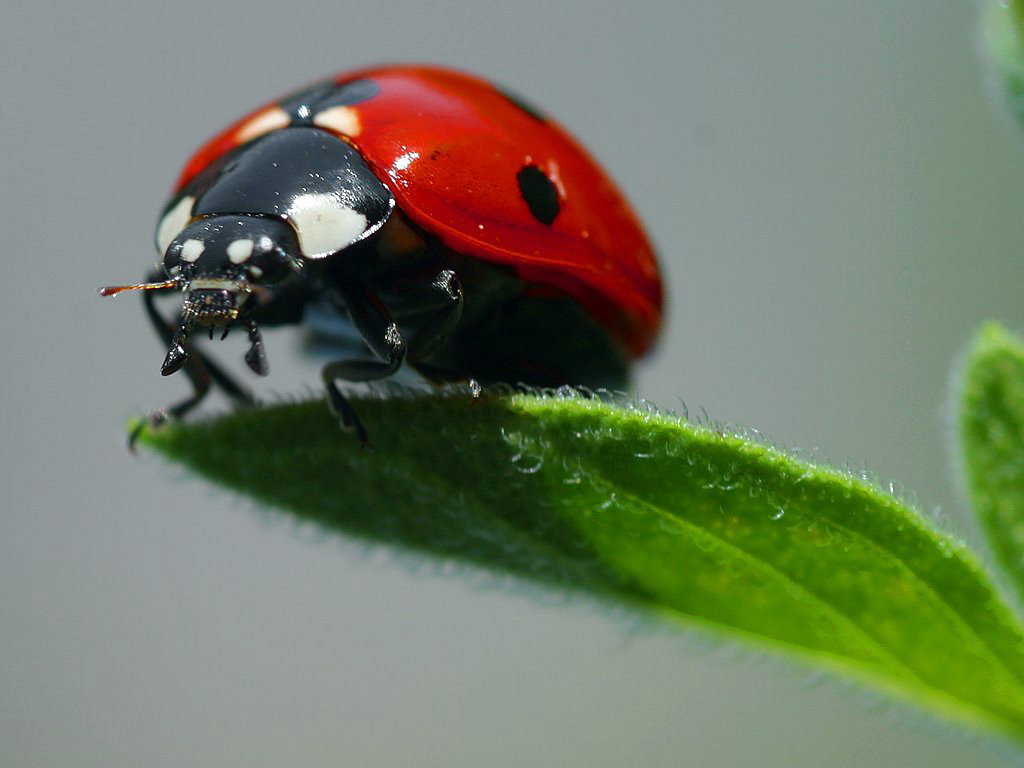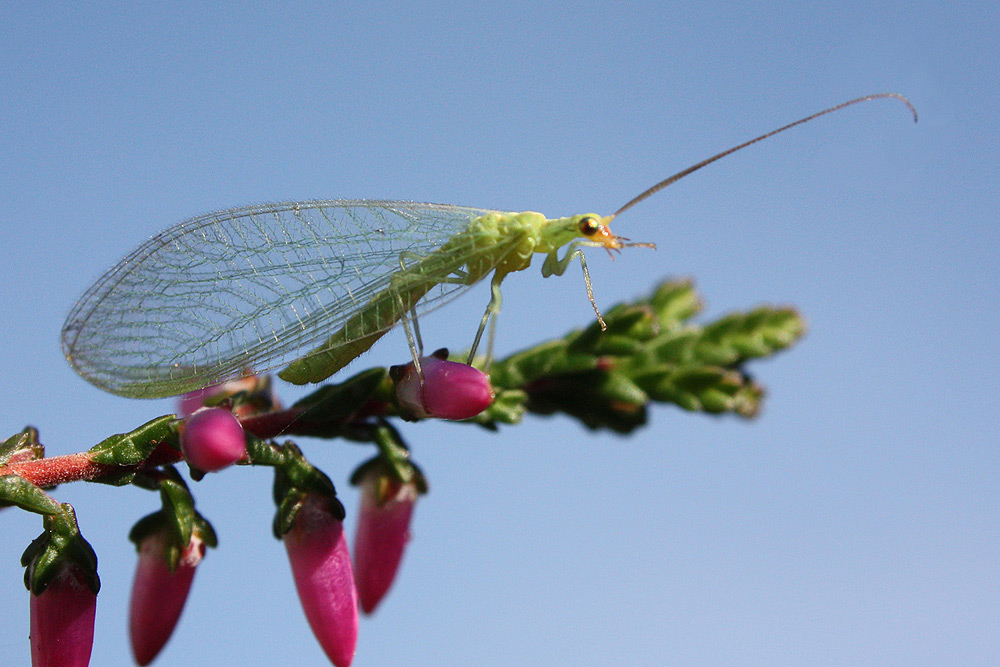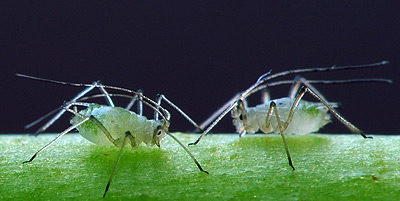
Aphids - Greenfly, Blackfly etc
Plant
Pests
Signs - Usually thought of as
greenfly, but aphids can be black, yellow, pink, greyish-white
and brown. About 2mm long when fully grown and roundish.Damage - Heavy infestations can reduce the vigour of a plant and leave it vulnerable to attack by other pests and diseases. Aphids can frequently spread virus diseases as they move from one infected plant to another. these are usually characterised by irregular yellow patches on the leaves which may be wrinkled but otherwise alive.
Treatment - There are a myriad ways of dealing with aphids of various types. They fall into four categories:
- Encourage natural predators
- Biological control
- Traditional organic remedies
- Chemical remedies
Encourage natural predators
Such as ladybirds, lacewings and hoverflies, by planting nectar-rich flowering plants which attract them, such as buddleia, calendula, sedum, stocks, sweet william, lilies and wallflowers.
If you grow a patch of nettles somewhere in the garden, this will encourage aphids and their predators. Cut back the nettles when aphids appear in other parts of your garden to encourage the predators to seek them out. Lacewing houses can be made or bought to put up in the garden so they have a shelter for the winter, see here.
Small birds such as blue tits (especially) and great tits will happily eat aphids on plants so if you encourage them in your garden by putting up nesting boxes and feeding them over the winter, they will expand their diet to your benefit by gobbling up aphids, they seem to be a particular favourite of young fledglings.
Wasps aren't the first thing you think of welcoming to your garden but they are excellent insect predators. Some years ago we had two wasp nests in the eaves of the house, they weren't bothering us, so we left them and it was the only year I didn't find a single pest of any kind in the garden, they hoovered up everything. Once they had gone we fixed the holes in the eaves where they got in, but they only use a nest for one year anyway. Last year I had a small underground wasp nest in a corner of my allotment and along with aphids, they kept my brussels plants largely free of caterpillars too, so I marked the nest with a bright orange plant pot on a short cane so I didn't inadvertently tread on it.
I'm not saying to necessarily actively encourage wasps to nest in your garden or house, but if they do choose to do so, consider if it might be viable to leave them as they will be best natural pest predators you will ever have.
Biological control
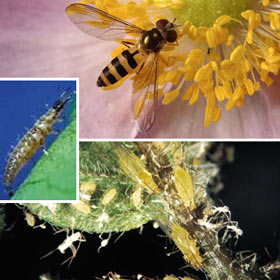 Similar
to encouraging natural predators, but giving them a helping
hand by introducing them as well as just hoping that they will
happen along of their own accord.
Similar
to encouraging natural predators, but giving them a helping
hand by introducing them as well as just hoping that they will
happen along of their own accord.Biological control of a pest relies on introducing a predator species so "fighting nature with nature", if chosen carefully, the predator will stop damage to your plants without damaging the environment. Such biological controls are safe for the user, children and pets. They will not harm other beneficial garden insects and are biodegradable.
They do rely on the predator always having some food though, or they will die out, so like other organic practices it is a question of maintaining a small population of pests to allow the predators to be ready for them, in this case though the balance is skewed away from the problem.
It is possible to buy-in aphid predators for use in greenhouses and conservatories, used outdoors they are less effective as they tend to disperse.
Traditional organic remedies
![]() Companion planting - Plant garlic cloves (just one
or two) among rose bushes. An infusion of garlic crushed into
water and sprayed on the aphids will also help remove them.
Many herbs, such as hyssop, sage, dill, lavender and thyme discourage
aphids if planted near to susceptible plants.
Companion planting - Plant garlic cloves (just one
or two) among rose bushes. An infusion of garlic crushed into
water and sprayed on the aphids will also help remove them.
Many herbs, such as hyssop, sage, dill, lavender and thyme discourage
aphids if planted near to susceptible plants.
![]() Nettle spray. The common stinging nettle
is a discerning plant that requires high levels of nitrogen
in the soil to grow well. As well as using nettles as an activator
on the compost heap the organic gardener can use them as a liquid
manure and as an aphicide - to kill aphids.
Nettle spray. The common stinging nettle
is a discerning plant that requires high levels of nitrogen
in the soil to grow well. As well as using nettles as an activator
on the compost heap the organic gardener can use them as a liquid
manure and as an aphicide - to kill aphids.
Gather 224g
(l/21b) young nettles and soak in a bucket of water for a week.
Strain and use undiluted as a control of aphids on roses and
celery leaf miner. Add the mushy nettles to the compost heap.
![]() Rhubarb spray. The oxalic acid
in rhubarb leaves is a safe control agent for aphids, particularly
those on roses. Cut 450g (1lb) rhubarb leaves, place in an old
saucepan (the oxalic acid may damage one that you still use)
with 1.1 litres (2pt) water and boil for half an hour, topping
up as necessary. When cool, add 1 dessertspoon of soap flakes
dissolved in 275ml (1/2pt) warm water. This acts as the wetting
agent when added to the strained rhubarb liquid. Stir the mixture
thoroughly and use undiluted as a spray.
Rhubarb spray. The oxalic acid
in rhubarb leaves is a safe control agent for aphids, particularly
those on roses. Cut 450g (1lb) rhubarb leaves, place in an old
saucepan (the oxalic acid may damage one that you still use)
with 1.1 litres (2pt) water and boil for half an hour, topping
up as necessary. When cool, add 1 dessertspoon of soap flakes
dissolved in 275ml (1/2pt) warm water. This acts as the wetting
agent when added to the strained rhubarb liquid. Stir the mixture
thoroughly and use undiluted as a spray.
![]() Elder spray.. This kills
aphids, small caterpillars and is useful as a fungicide for
mildew and blackspot on roses. The toxic agent is hydro-cyanic
acid, so in preparing the spray use an old saucepan.
Elder spray.. This kills
aphids, small caterpillars and is useful as a fungicide for
mildew and blackspot on roses. The toxic agent is hydro-cyanic
acid, so in preparing the spray use an old saucepan.
Gather 450g (1 lb) leaves and young stems of elder prefer-ably
in spring when the sap is rising. Place in the saucepan and
add 3.3 litres (6pt) water. Boil for half an hour, topping up
as necessary. Strain through old tights and use the liquid cold
and undiluted. It will keep for three months if bottled tightly
while still hot.

Insect
hotel / house
A sheltered insect house to help a range of beneficial
insects to over-winter in your garden. If they are over-wintering there,
they are in an ideal position come the spring and summer to wake up and
help to combat any pests you may have. Amongst others, good for ladybirds,
lacewings and solitary wasps which will help keep your unwanted garden visitors
down. Place in a sheltered place outdoors.
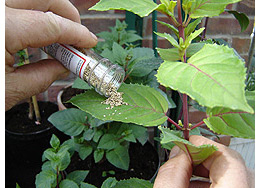
Biological
Pest Control - Organic living pest control for a variety of
problems, red spider mite, whitefly, fungus gnats (sciarid fly), thrips, mealy bug,
vine weevils and more.
These are parasites or predators that will specifically infect the pest they are brought in to control without harming any other living things and without the use of chemicals. A small population of pests needs to be maintained so that the control agent doesn't die out.

Chemical insecticides - If your plants get a heavy infestation, then I think it's acceptable to use a chemical insecticide as a "smart missile" just on that particular plant. I resort to this when the aphids build up under cover on my favourite plum tree, or other plant/s. Don't overdo it and spray too often and don't spray the whole garden "just-in-case", buy a small 1L or thereabouts sprayer so you don't get carried away.
Not pest specific.
Q & A
Q. Hello, and help I have an old hedgerow at the end of my garden it's been there god knows how long, it has the usual plants that you find in hedgerows all over Ireland Hawthorn, Honey suckle, Elder. My Problem is the Elder tree is covered with small black flies the leaves are falling and the tree has developed a scruffy appearance what can I do to remedy this as I really love the hedge and so do the birds. Can you help?
A. It sounds like your elder
has a bad attack of blackfly. Elder are susceptible to this
but some years are worse than others. You could spray with a
systemic insecticide though I would advise against a chemical
spray as it is part of a hedgerow with associated wildlife.
You could spray an organic remedy on it based on natural soaps
(should be available commercially down the garden centre) though
I haven't found these of much use myself. I'd approach it in
one of two ways:
1/ It's a part of natures cycle and may die or will survive and next year won't be as bad (or it will die then).
2/ Cut off the worst affected parts with insects attached and destroy them or remove down the tip, a sort of modified version of "1" above.
We expect our gardens to be full of healthy plants with no signs of nature. Blackfly and elder are as much a part of nature as are the birds that enjoy your hedgerow, they're both native species - depends on how you see your local ecosystem.
Reasons to like aphids
- Early in the season only females are produced so that when one or two have found a nice tender stem, they can multiply most rapidly to take best advantage of this. Males aren't required at all, a process known as "parthenogenesis" or virgin birth, the daughters are genetically identical to the mother.
- During parthenogenesis the baby aphids are born already pregnant, so grandma has daughter already pregnant with granddaughter.
- Later in the season, the aphids start to produce males so that they can leave and breed with other females, so diversifying the gene pool, introducing much needed variety to what would become a vulnerable monoculture with narrow genetic diversity. We wouldn't want them dying out would we?
- Aphids have very narrow proboscis's (probosci ?) that can penetrate a single cell of a single phloem tube that carries sugars and other goodies around the plant. In this way, waste is kept minimized and the aphids are fed under pressure - they don't even have to suck!
-
Scientists have taken advantage of this and anaesthetize aphids with a blast of carbon dioxide before cutting the proboscis at the end and so getting a fine tube that is inserted in exactly the right place and depth to a single phloem cell to take (tiny) sap samples.
- The sticky "honeydew" that many aphids secrete are plant juices that are surplus to needs. Aphids have only one source of food and that has relatively too many dissolved sugars and not enough other things - specifically amino acids - so the poor old aphid has to drink more sap that it wants, and dump some of the sugars to make sure it has enough amino acids. The discarded honeydew can make your car sticky and also allow fungus to take hold on plants as it gives the leaves a nice sugary coating to get the spores started.
I know they're not really reasons to like aphids, but maybe by first understanding them....
Picture credits: Aphids top of page used courtesy Lviatour - published under GNU Free Documentation License, Version 1.2 / Lacewing courtesy of Charlesjsharp published under CC 3.0 Attribution Share and Share Alike Unported license.
Copyright 2000 - present. All Rights Reserved | Privacy Policy Statement

